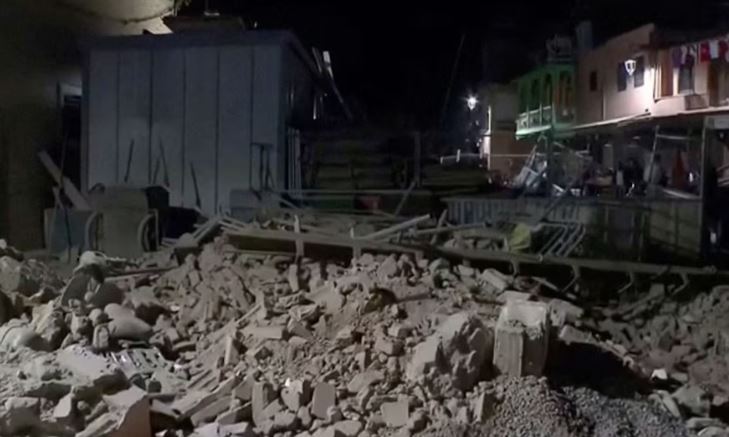Late on Friday night, a rare and violent earthquake slammed Morocco, killing hundreds and causing widespread damage from the Atlas Mountain villages to the ancient city of Marrakech.
The Interior Ministry of Morocco said Saturday morning that 632 people had perished as a result of the earthquake, most of them in Marrakech and five provinces close to the epicentre. There were 329 more casualties. As the search continues and rescuers reach increasingly inaccessible places, the number of casualties is anticipated to climb.
Many people remained inside their homes in Morocco because of the earthquake, and TV stations aired the aftermath.
Families waited anxiously on the streets or gathered together on the sidewalks, some with toddlers in their arms and others holding blankets or other items.
The fluorescent yellow vests of the rescue workers lit up the night as they searched the wreckage of buildings for survivors. A automobile was almost buried by falling pieces of a structure, while a house had a huge hole in it after the quake.
Among the stones that made up what was left of one structure were remnants of baskets, buckets and articles of clothes.
One of Marrakech’s most recognisable buildings, the 12th-century Koutoubia Mosque, was reportedly damaged, however the extent of the damage remained unclear from media reports. The minaret, which stands 69 metres (226 feet) tall, has earned the nickname “roof of Marrakech.”
Videos depicting damage to the historic red walls of Marrakech, a UNESCO World Heritage site, were also shared online by concerned Moroccans.
According to the mayor of a town close to the epicentre, some houses in other towns have fallen, and power and roads have been knocked out for some residents.
Talat N’Yaaqoub’s mayor, Abderrahim Ait Daoud, stated that officials are attempting to clear roads in Al Haouz Province to enable access for ambulances and help to the affected people, but that it would take time to understand the extent of the damage due to the great distances between mountain settlements.
The rescue attempts were slowed, according to local media, since the roads leading to the mountain area surrounding the epicentre were clogged with cars and obstructed by crumbled boulders.
The beautiful High Atlas vistas and Amazigh settlements carved into the mountainsides may be seen at Al Haouz.
On Saturday, messages of solidarity started pouring in from all across the globe. Olaf Scholz, the chancellor of Germany, expressed his sympathies via X (previously Twitter). As host of the Group of 20 summit of the world’s leading economies, Narendra Modi of India tweeted, “India is ready to offer all possible assistance to Morocco in this difficult time.”
The quake occurred around 11:11 p.m. (2211 GMT) with a preliminary magnitude of 6.8, and it lasted for several seconds, according to the US Geological Survey. Nineteen minutes later, a magnitude 4.9 aftershock was detected by the United States agency.
On Friday, an earthquake struck around 70 kilometres (43.5 miles) south of Marrakech, near the town of Ighil in Al Haouz Province.
According to the United States Geological Survey, the earthquake’s epicentre was located at a depth of 18 kilometres (11 miles), but Morocco’s seismic service estimated a depth of 11 kilometres (7 miles). The hazard posed by shallow earthquakes is greater.
According to official statistics, 4,520,569 people make their homes in the Marrakech-Safi area, which consists of cities, small villages, and open terrain. Initial reports indicate widespread damage and fatalities.
Quakes are uncommon in this part of Africa. According to 2M TV, the National Institute of Geophysics’s Seismic Monitoring and Warning Department Head Lahcen Mhanni said that this earthquake was the strongest ever recorded in the mountains.
A magnitude 5.8 earthquake hit a region of Morocco in 1960, killing hundreds in and around the city of Agadir.
Morocco has revised its building codes in the wake of the 2003 Agadir earthquake, although many older structures and rural dwellings are still not up to code.
More than 600 people were killed in a 2004 earthquake that occurred near the city of Al Hoceima on the Mediterranean coast.
The Portuguese Institute of Sea and Atmosphere and the Algerian organisation in charge of emergency response both reported feeling the tremors of Friday’s earthquake.

